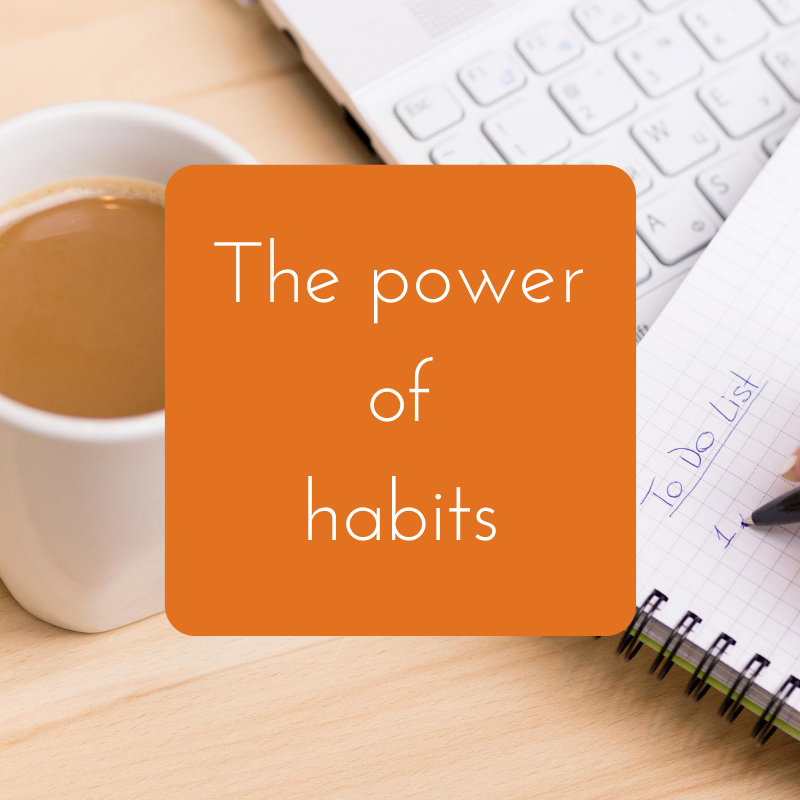Habits are funny little things.
They are incredibly powerful, yet often you won’t even realise they are there.
Good habits enrich your day and make life easier.
Bad habits (although maybe “bad” is too strong a word here) can keep you stuck and hold you back.
The thing is, like it or not, you have hundreds of habits that are making their mark on your day.
Good habit example: Brushing your teeth.
You don’t even think about it as a thing you have to do in your day. I’m sure you don’t add it to your to-do list, or complain that you don’t have time for it. You just do it.
Bad habit example: Mindless social media scrolling in bed.
This one is personal, it’s one of my bad habits.
I head to bed at a reasonable time (children permitting), but rather than slow my mind and get some sleep, I find myself mindlessly scrolling social media for another hour or so.
Not only does this reduce the amount of sleep that I get, but it definitely doesn’t help to quiet my mind.
Both of these things are just habits.
I don’t set out to do them.
I don’t purposely put aside time in my calendar for them
They just happen
And as you can see, good habits which just happen, are great.
But bad habits that just happen, can eat into your day without you realising.
So, how do you take control of your habits, rather than letting them control your time?
Start to take note of how you spend your time
You can just make a mental note of how you spend your time during the day… or you can get really specific and use a time tracker. (To be honest, if you want the best results here, then you need to get specific. The funny thing with habits is that they just happen without you noticing, so it can be hard to make a mental note of them all).
I’ve used a paper version of a time tracker before. It is a simple a table that breaks the day down into 15min chunks. As I go through the day, I simply make a note of what I did during that 15min.
The important thing here is to try and track a normal day, rather than being on your “best behaviour” simply because you are keeping track.
If paper isn’t your jam, there are plenty of time track apps available, the theory is the same.
Recognise the good and the “bad”
I really should start calling these the “not so good”. At the end of the day, they aren’t bad as such, just things that you do, that you might prefer not to do. Anyway, I digress.
Look over your time tracker and how you spent your time.
Start to make a list of the things that you do which are habits (eg that happen every day, or almost every day)
List the good and the “not so good”. Recognise the habits that you have that you are proud of, or that fuel you.
But start to notice the ones that you don’t love so much.
Take one step at a time.
You can’t change every single habit over night… it just doesn’t work that way.
They say it takes 21 days to build a habit… but honestly I think it can take a lot longer to break one that has been there for a long time, and to make a long standing new one.
Which means, simply select one thing on that list that you want to change, and focus on that one first.
Replace the habit with something else.
They say that part of the problem with giving up smoking (other than the very real chemical addiction of course) is the habit. The fact that you are used to having something in your hand, or having a cigarette at certain times, eg after dinner.
The best way to stop yourself reaching for an old habit, is by filling the time with something new.
My personal example:
To break the habit of mindless scrolling, I put a book next to my bed instead (and in a perfect world, I move my phone out of the room).
Rather than laying with nothing to do at this time and reaching for my phone simply out of boredom and habit, now I can reach for the book instead.
And remember… just one at a time.
I know… you’ll recognise all the things you want to improve, and you’ll want to improve them all at once.
I’ve been there (I’m still there), I understand.
But if you attempt to change every part of your day, and all of your habits at once, you’re just setting yourself up to fail.
Start with one tiny little thing.
Just one
And make that change.
And stick to it. For 5 days, or 21 days, or even 3 months, before you try and change the next habit (I’ll leave the timeline up to you, I don’t have the patience to wait ages for every new thing)
Over to you…
What habits would you like to change? Or what new habits would you like to embrace?
Deciding is the first step in making a change.
Sam

